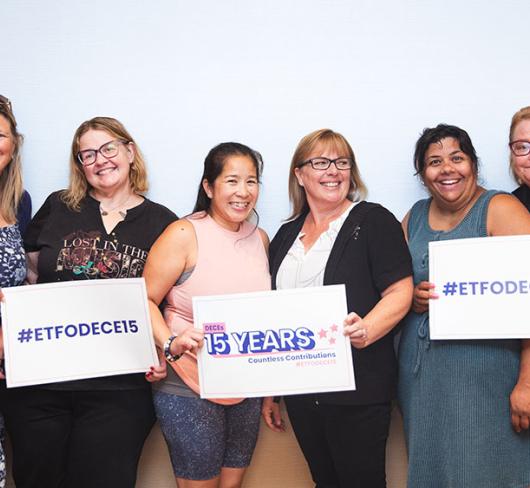Reaching Out and Listening: Understanding What is Happening in the Early Learning Kindergarten Program (Professional Services)
Professional Services staff always try to keep a finger on the pulse of our membership. What do our members need in the area of professional learning? What are their issues and concerns when new programs are implemented? Do new resources need to be developed? Conducting member research is one way to get feedback. Over the years, ETFO researcher Pat McAdie has asked for your opinion on many issues. ETFO has used this research to lobby the government, provide feedback to the president and the executive, advocate for new programs, and negotiate collective agreements.
ETFO surveys its members
Last April, 481 ETFO members working in the Early Learning Kindergarten (ELK) program responded to a survey about their experiences during the program’s first year. The respondents included 327 teachers from all but two boards, and 128 designated early childhood educators (DECEs) from all of the locals that ETFO represents. Here is an overview of what we learned.
A successful first year
The full-day Early Learning–Kindergarten program is delivered by a teacher and a DECE working together using a play-based curriculum. This is a new approach for Ontario kindergarten programs.
The survey showed that both teachers and DECEs felt the program was successful in its first year. The vast majority agreed that students were progressing well.
Play-based learning
Play as a teaching strategy is regaining importance, and most teachers and DECEs agreed that they have a good understanding of this methodology and are able to implement it. However, access to resources was an issue for a significant number.
Support for the ELK program
A number of questions asked whether others in the school and community supported the program.
Generally, teachers and DECEs had a very similar perspective on the level of support from parents, other teaching staff, school administrators, and boards. The overwhelming majority said these groups support the program. Some survey respondents believed that for non-ELK teachers and administrators understanding the program was sometimes a challenge.
Planning time
Finding joint planning time was an issue for many: 68 percent of teachers and 48 percent of DECEs stated that they did not have any regularly scheduled, coordinated, or common planning time. Fewer than one in five said they had such time scheduled every week or had common planning time with their partner prior to the start of the school year.
Roles and responsibilities
A significant minority of teachers (37 percent) and DECEs (43 percent) felt that they had not received clear direction from their school board about the ELK program and their role. Both teachers and DECEs felt they needed more clarity about their roles in the classroom. They also felt they needed time and support to understand working as a team. Despite this, most agreed that they worked well with their partners.
Class size and facilities
Throughout the survey, there were many comments about large class sizes – classes of 28,30, or more. A majority (58 percent) said their classroom was too small. For some, a previous kindergarten classroom was not large enough for the additional students; others were using a classroom that was not designed for kindergarten. Lack of storage space and inadequate washroom facilities were also concerns.
What would you like to change? What would you keep the same?
Most commonly, members wanted smaller classes. Many mentioned a cap on class size, often referring to the cap on other primary classes. Other preferred changes included more resources and facilities, more training and professional development, more common planning time, and clearer role definitions.
Many DECEs would like to improve their rights, referring to such changes as improved planning time and recognition of their qualifications by parents and other staff. Many teachers highlighted the positive nature of working with an DECE. Both teachers and DECEs valued the full-day program and the playbased curriculum.
Looking ahead
This research provided ETFO with some wonderful data on what happened to our members in the ELK classrooms. But, as we move into the second year of implementation, we want to find out more.
Do the findings still hold true? Have attitudes to the ELK program changed?
In order to explore this topic further, ETFO executive staff Dr. Janet Millar-Grant and Dr. Anne Rodrigue will conduct three focus group sessions with ELK teachers and DECEs. Focus groups let researchers observe interactions on a specific topic and help us understand the perceptions and nuances attached to these issues from the perspectives of classroom educators. These sessions will provide us with a deeper understanding of the issues that we need to discuss with ministry of education officials or to address at the bargaining table. We also hope to learn what specific professional development opportunities and resources would be most beneficial to our members. Many members quickly responded to an invitation to attend focus group sessions when it was posted on the ETFO website. Obviously, our members want to talk with us about their day-to-day experiences in the ELK classroom. We selected participants on the basis of geography, local representation, and demographics. The focus groups will be held January 21 and the results of the research will be the subject of a future article in Voice.
